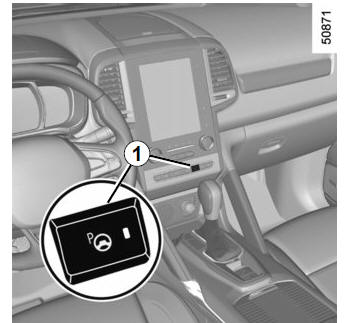
This function assists with parking manoeuvres.
Take your hands off the steering wheel.
You only control the pedals and the
gear lever.
You can retake control at any time by
operating the steering wheel.
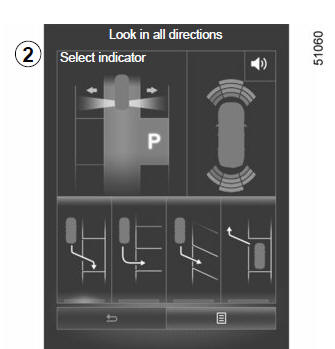
Switching on
With the vehicle at a standstill or driving
at less than approximately 18.6 mph
(30 km/h), press switch 1. The warning
light integrated on switch 1 lights up
and the 2 screen appears on the multifunction
screen.
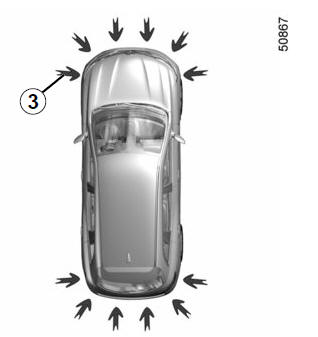
Special features
Ensure that the ultrasonic sensors indicated
by arrows 3 are not obscured (by
dirt, mud, snow, etc.).
Choice of manoeuvre
The system can perform four types of
manoeuvres:
- 4 parallel parking;
- 5 perpendicular parking;
- 6 angle parking;
- 7 moving out of a parallel parking
space.
From the multifunction screen, select
the manoeuvre to be performed.
And activate the direction indicator (turn
signal) on the side you wish to park.
Note: When starting the vehicle, or
after successfully completed parallel
parking using the system, the default
manoeuvre proposed by the system is
assistance in exiting a parallel parking
space. In other cases, the default manoeuvre
can be set with 8 from the multifunction
screen.
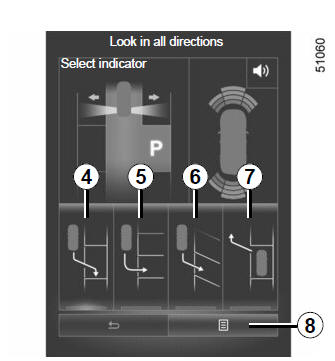
Operation
Parking
As long as the vehicle speed is less
than 18.6 mph (30 km/h), the system
looks for available parking spaces on
both sides of the vehicle.
Once a space has been found, it is displayed
on the multifunction screen, indicated
by a small letter "P". Drive slowly,
with the indicators activated on the side
of the space, until the message "Stop"
is displayed, alongside a beep.
The space is then indicated on the multifunction
screen by a capital "P".
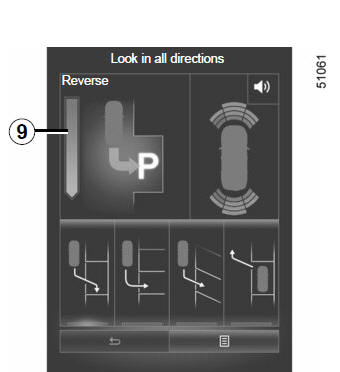
- Stop the vehicle;
- select reverse gear.
Warning light  lights up on the
instrument
panel, along with a beep. lights up on the
instrument
panel, along with a beep.
- release the steering wheel;
- follow the system instructions provided
on the multifunction screen.
Your speed should not exceed around
4 mph (7 km/h). Bar 9 tells you the
progress.
Once the warning light  on the
instrument panel goes off and a beep
sounds, the manoeuvre has been completed. on the
instrument panel goes off and a beep
sounds, the manoeuvre has been completed.
Special note
-
Drive slowly and always be ready to
use the brake;
-
The system can not detect parking
spaces between objects except for
vehicles such as a post, motorbike or
obstacle;
-
The system can not detect parking
spaces made after detecting or
before detecting;
-
Maintain the distance about
50~150 cm from the parked vehicles
when looking for parking spaces.
The system may not detect spaces
when the distance is less than 50 cm
or over 150 cm;
-
You can move the gear lever position
R to D or D to R while parking. The
system is still available.
-
The driver should look out for the detected
space if it is possible to park
(obstacles in the space);
-
If you fit a different tire or wheel,
the system performance may be
changed. For the best performance,
fit the same size with original one;
-
The system may not work if the
wheels are misaligned. Contact an
approved dealer.
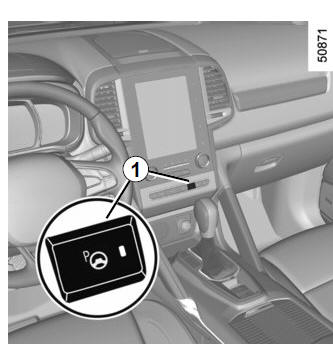
Exiting a parallel parking space
- Select "exit parallel parking space"
mode;
- activate the direction indicator on the
side you wish to go out of;
- press and hold switch 1 (around
2 seconds).
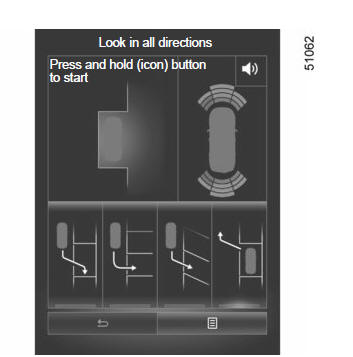
Warning light  lights up on the
instrument
panel, along with a beep. lights up on the
instrument
panel, along with a beep.
- release the steering wheel;
- go forwards and backwards using
the parking distance control system
alerts.
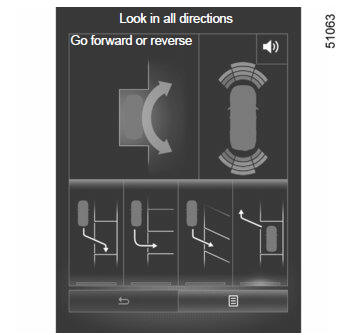
Your speed should not exceed around
4 mph (7 km/h).
Once in position to exit the space, the
system will notify you of the end of the
manoeuvre.
Once the warning light  on the
instrument panel goes off and a beep
sounds, the manoeuvre has been completed. on the
instrument panel goes off and a beep
sounds, the manoeuvre has been completed.
Special note
-
While exiting the parking space, the
system is disrupted for safety when
there is risk to impact with obstacles;
-
The system may not be operated
when the space is small;
-
When exiting or parking the space,
drive forwards or backwards after rotating
steering wheel.
-
In case that the sensor is frozen or
obscured, the surrounding has very
high or small objects or posts, the
system can be disrupted although
there is exiting space.
Suspending the manoeuvre
The manoeuvre is suspended in the following
circumstances:
- you take control of the wheel;
- a door or the boot is opened;
- the vehicle is at a standstill for too
long;
- an obstacle in the direction of movement
prevents the manoeuvre from
being completed;
- the engine will stop.
Once the warning light  on the
instrument panel goes off and a beep
sounds, the manoeuvre has been suspended. on the
instrument panel goes off and a beep
sounds, the manoeuvre has been suspended.
Then to resume the manoeuvre,
press and hold the system activation
switch.
In this case, the reason for suspending
the manoeuvre will be displayed on the
multifunction screen.
Make sure:
- you have released the steering wheel
and;
- that all doors and the boot are closed,
and;
- that no obstacles are in the way of
the direction of movement, and;
- that the engine is started.
Cancelling the manoeuvre
The manoeuvre can be stopped in the
following cases:
- by pressing the system activation
switch;
- the vehicle speed has exceeded
4 mph (7 km/h);
- You have performed more than ten
forwards/backwards movements in
one manoeuvre;
- the parking distance control sensors
are dirty or blocked;
- the vehicle wheels have skidded.
Once the warning light  on the
instrument panel goes off and a beep
sounds, the manoeuvre has been
ended. on the
instrument panel goes off and a beep
sounds, the manoeuvre has been
ended.
Special note
The system may be disrupted in the
following circumstances. In this cases,
you should park by yourself because of
risk to impact;
- if there are obstacles around posts;
- if the parking space has obstacles
such as bicycles, motorbikes, narrow
posts, etc;
- if the parking space is winding, slippery
or uneven;
- if the tire pressure is lower or higher
than the standard;
- in very bad weather (heavy rain,
snow or strong winds);
- fitting different tires (snow chain,
spare tire, different size wheel).
| This function is an additional driving aid. However, this function
is not under any circumstances intended to replace the
due care and attention of the driver, who should at all times be in
control of the vehicle.
Make sure that the manoeuvre complies with the applicable traffic
regulations at your location.
- The driver should always look out for sudden hazards during
driving: always ensure that there are no moving obstacles
(such as a child, animal, pram, bicycle, etc.) or small, narrow
objects such as stones or posts in your path when manoeuvring.
- The system cannot detect objects located in the sensor blind
spots.
- When manoeuvring, the steering wheel may turn quickly: do not
put your hands inside, and make sure that nothing is caught
inside.
- Always visually check that the parking space proposed by the
system is still available and contains no obstacles.
- The system should be deactivated when towing a trailer.
|
| 





 lights up on the
instrument
panel, along with a beep.
lights up on the
instrument
panel, along with a beep.


 on the
instrument panel goes off and a beep
sounds, the manoeuvre has been completed.
on the
instrument panel goes off and a beep
sounds, the manoeuvre has been completed.
